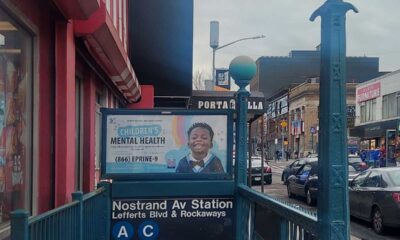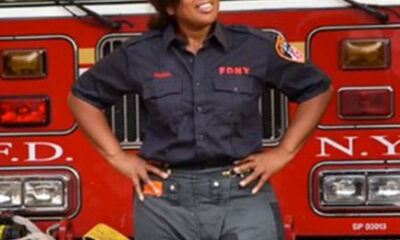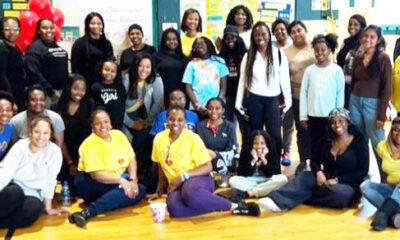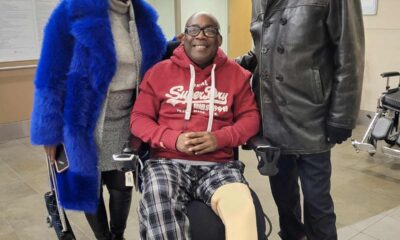Education
Mama Fela Barclift announces 2024 retirement from Little Sun People

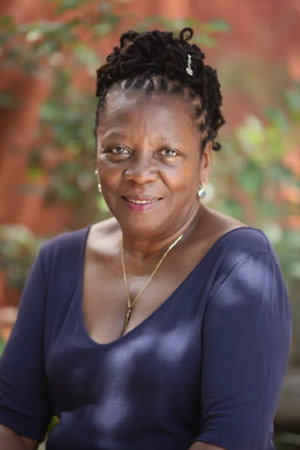
By Nayaba Arinde
Editor-at-Large
After 43 years of gently cultivating the minds of thousands of Black children in Brooklyn, the beloved Mama Fela Barclift recently announced that she is stepping down from heading Little Sun People, the African-centered preschool she began in her Bed Stuy brownstone.
It is not certain, as of press time, if the most tears shed were from parents, former students, or current young scholars. Do not worry though; she will not be leaving until next summer. But who could replace her?
“My daughter Aaliyah is one of the very strong candidates, with her years of experience here and the fact that the school was created for her,” Mama Fela told Our Time Press.
Unapologetically bold in its Afrocentric-focused curriculum and agenda, Mama Fela’s Little Sun People has established itself as an educational cornerstone in Central Brooklyn.
Teaching the babies from 2 to five is not all “Rabbits, bunnies, and diaper changes,” said Mama Fela.
Indeed, it is not. For 43 years, with her beautifully dedicated staff, she has gently coaxed Bed Stuy’s youngest to love learning as they play, socialize, and develop a strong sense of self.
Walking into the brightly decorated school on Classon Avenue is like immediately entering a safe space with palpable love bouncing off the walls. Parents are welcomed by Lateefa Carter, who knows every child, and greets them with the warmth of a nurturing grandmother.
All the Little Sun People educators and staff create this wonderful environment for the preschoolers.
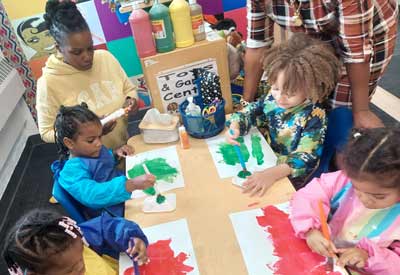
“I was a child of The East,” Mama Fela told Our Time Press, speaking of the Bed Stuy community-founded organization on the famous Claver Place. “I was one of the first teachers at Uhuru Sasa Shule (Freedom Now – Kiswahili). I was very fortunate to be mentored by some of the great Black thinkers of the time, as well as Pan-African speakers, who were unapologetic. They weren’t trying to make nice. They said, ‘Look, this is what is needed for Black people to move forward. We have been through so much, and we are still going through so much. If we are going to move forward, these are some of the things that we are going to have to do. Including Jitu – who was just amazing; Connie Hicks, Herman Ferguson, Brother Boe, Baba Ishangi, and Yusef Iman; there were just so many folks popping in to take all our little 17, 18, 19-year-old minds and help us get perspective, after having grown up in a society where we were just denigrated so badly that it was really hard to have any true identity that made sense to us.”
Having been schooled by such elite champions of unobstructed Black excellence and possibility, Mama Fela was enabled to “get the feel of what it would be like to be an African in a positive way; from a strength-based position as opposed to some kind of cannibalistic, heathen, pagan, barbaric – all of the things that we had been taught were part of the African experience, so I learned so much from The East.”
So, when she became a parent, she wanted to give her children a similar educational beginning.
But the East preschool was gone, and there were many changes after the school moved over to the armory on Marcus Garvey Boulevard; with the African American Teacher’s Association’s Jitu Weusi having left and a “revolving door of leadership,” The East had lost some of the strength-based positions it had held in the original space.
In 1978, she bought her brownstone for $43,000 with her then husband, 2 cousins and mother; and had to consider the all-too-common dilemma of going into the workforce or staying at home with her one-year-old baby daughter, dissatisfied with the child-care and daycare options.
“I was devastated…I was going to all these Black communities, where they had daycare centers, and all the pictures they had on the wall were of white people and white constructs. Looked in the doll bin and not a Black or Brown doll in there, and not a storybook – nothing.”
While she was able to place her three-year-old son in one of The East independent offshoot schools, the Shule Ya Mapinduzi School, there was no school of equal measure for her one-year-old girl.
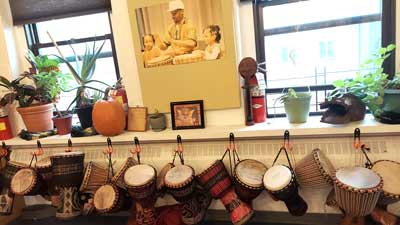
Mama Fela said that through her tears, she decided, “I cannot leave this child, running all over the state looking at other people’s racism – and dumping her into this horrible racist system.”
So, with an available floor in her brownstone, she left her decently paid diversity and inclusion State job and said, ‘Alright, I’m going to make this into a daycare, and I will just take her at least until she is three, and then I can put her into Weusi Shule, or Shule Ya Mapainduzi.”
The plan was only to have her school for two years “and then jump back out there into the big people’s world,” but as fate would have it 40 years later – here we are. And Bed Stuy is grateful for it.
Alongside a team of parents, bold creativity became second nature as they had to make everything from coloring in storybooks (Little Black Sambo could never make the cut, and Brer Rabbit did not suffice); to re-making dolls – “curling up their hair,” and painting their faces, to creating fun-but-educational toys. They would purchase some from Kwanzaa events and the African Street Festival at Boys and Girls High School.
“We had artists come in and paint the walls and craftspeople, and all brothers and sisters working together. And I was collecting music, drums, and African fabrics, just anything that would present a picture of Africa as a beautiful place.”
With a starting class of just three children, including her daughter, “with the help of all those people, we were able to open the doors,” said Mama Fela, smiling broadly as she reminisced. “I like talking about the school,” she nodded.
Within about six months, word got out that there was a great new school on Jefferson Avenue, and grateful parents came with their excited progeny.
She said that she just wanted to make just enough money to cover the basics, but 43 years later, “Once I got into it, I realized that I really loved it,” she said. “The work was so exciting. It was so challenging and interesting. And the biggest thing for me was I always wanted to make a difference for our people, for my people, for me. I felt I was making a difference.
“I remember a lot of Black organizations which just fell apart from so much internalized stuff. Most of that, I recognized, comes from very early. You can’t teach African history in college, and think all of a sudden they’re good. No. You have to start when they are very young—helping them understand that you are a gift to the universe. You belong here; you are a genius. That your black skin is beautiful. Your hair is excellent. Everything about you is righteous. You teach this at the beginning. You can’t do that later on because once later on comes – that’s too late.”
Her’s, she then realized, was “unheralded work,” she said.
“These zero to five years mean everything,” said Mama Fela, her voice slightly raised for powerful emphasis. “All these people in therapy, when they sit down on the therapist’s couch, the first thing they ask is, ‘What happened to you when you were one?’ They know that whatever happens then impacts everything from then on. So this is the good work. So even though I am not going to get rich from it, I’m okay.”
The school is held in such tremendously high regard that many people clamored for seats each September. From children and grandbabies of everyday people to those of local politicians like the late Assembly Al Vann, Assemblywoman Annette Robinson, and City Councilman Charles Barron; to professionals like Attorney Esmeralda Simmons and Attorney Roger Wareham; and to business owners and city workers. Mama Fela has earned the respect of thousands of Brooklynites as she promoted the importance of African-centered education.
Mama Fela Barclift earned her undergraduate Education degree at Brooklyn College and went to Manhattan’s Bank Street College for her Master’s Degree in Administration and Supervision.
A true community icon who has built strong alliances with dozens of local businesses, grassroots groups, and community leaders, Mama Fela serves on the Board of Directors for Child Development Support Corporation and is a member of the NAACP and The Schomburg Center for Research in Black Culture.
Acknowledged in 2021 for her great works in the community, Mama Fela was one of five New Yorkers selected to be gifted the David Prize’s $200,000 award for the expansion of the school.
This will help as she is seeking to codify her curriculum. She told Our Time Press, “We’ve had to create an agenda. This is the most critical time of a person’s life. So we are working to codify our curriculum in 2024.”
Full disclosure: this reporter sent both of her children to LSP, and the after-school program.
For more information on the Little Sun People daycare center. log onto http://www.littlesunpeople.com/


